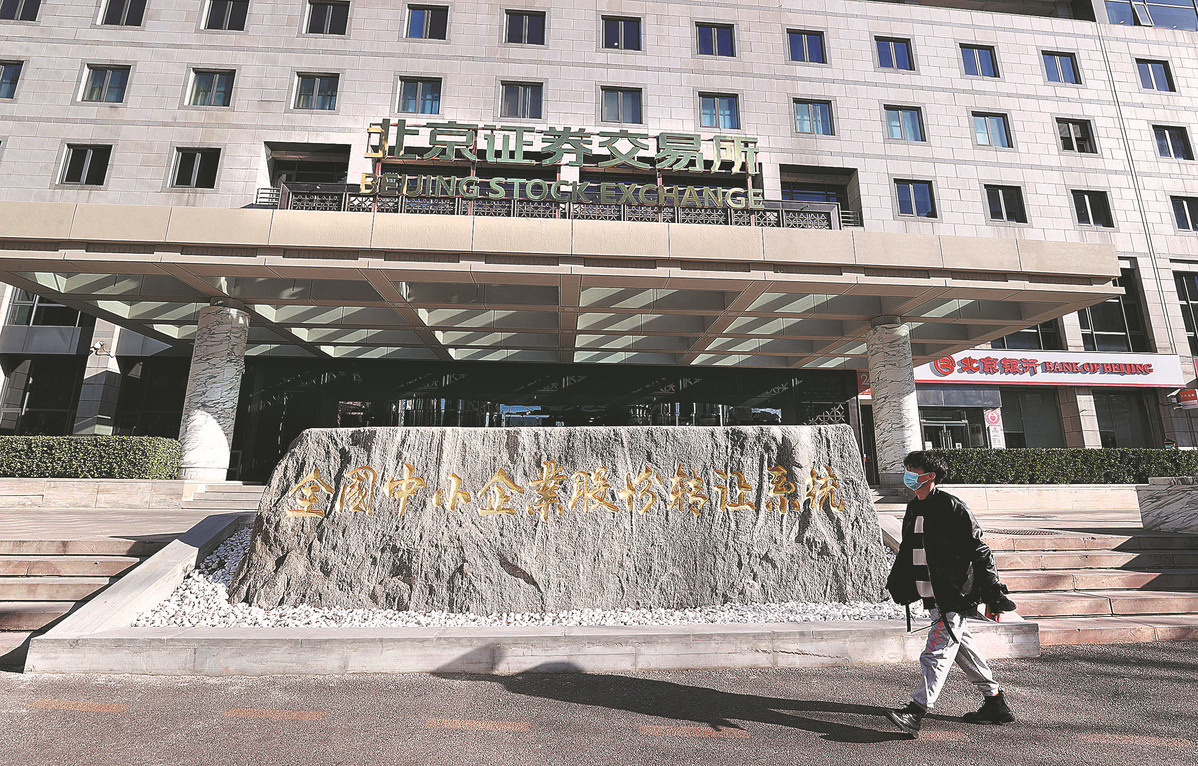Global investors take a shine to BSE

A pedestrian walks past the Beijing Stock Exchange. [Photo by Chen Xiaogen/For China Daily]
Amid stable operations of the Beijing Stock Exchange, overseas investors have sped up their mapping in this new bourse, which is set to nurture more technologically advanced small and medium-sized enterprises.
HSBC facilitated a transaction on the BSE placed by an offshore investor via the qualified foreign institutional investor scheme on Wednesday, making it the first international custodian to facilitate such a trade on the bourse.
On Nov 12, the BSE announced that QFII and renminbi qualified foreign institutional investors will be able to trade on the new bourse as long as they have obtained permission to trade from the National Equities and Exchange Quotations prior to Nov 15.
Theoretically, there is no policy barrier for foreign investors to trade in BSE-listed stocks. The first attempt made by HSBC indicates that technical problems that most custodians may encounter on a new exchange have been successfully solved, said industry insiders.
"The BSE has been built as a primary platform for direct financing of innovative SMEs. Since its launch, the bourse has attracted close attention from offshore investors seeking more diversified renminbi asset allocations. We expect more foreign investors to access the BSE for positions in high-quality and innovation-oriented SMEs. This will boost strategic emerging and high-tech industries," said Sophia Chung, head of securities services for HSBC in China.
The BSE's trading system is based on NEEQ Select, NEEQ's highest tier. Trading started on Nov 15, aiming to nurture more SMEs specializing in niche sectors, commanding a high market share, and boasting strong innovative capacity and core technologies.
At present, 83 companies have completed their floats on the new bourse, with the total market capitalization topping 263 billion yuan ($41 billion). Share prices of the companies that made their IPOs on the BSE have surged nearly 111 percent on average in the first month since their debut.
By Dec 15, the 71 companies that were transferred from the NEEQ Select to the BSE saw their shares rise 30 percent on average since the inception of the new bourse on Sept 2.
Through their moves so far, international industry leaders have indicated that they will not miss the BSE opportunity.
For instance, Switzerland's UBS Securities and Singapore's DBS Securities figured among the first 112 BSE members announced on Nov 12. Financial giant Credit Suisse Securities is completing procedures to become a BSE member in the near term, said the firm's CEO Tim Tu.
In addition, DBS Securities is advancing IPO projects for the BSE, which are expected to enter the application phase early this year.
To make the BSE more accessible to overseas investors, the stock connect mechanism, which has already been linking the Shanghai, Shenzhen and Hong Kong bourses for years now, should be adopted at the BSE as well, said Li Qiusuo, executive director of market strategy at CICC Research.
According to current regulations, an overseas investor should hold no more than a 10 percent stake in a BSE-listed company. If a BSE-listed company introduces more than one overseas investor, the company should have no more than 30 percent of its shares held by such investors.
Li suggested that the above upper limits should be moderately elevated based on strengthened supervision over information disclosure so that foreign investors can participate in BSE trading more flexibly. (Zhou Lanxu contributed to this story.)
- Economic Watch: Global firms capitalize on China's smart, green transformation
- Xinhua Commentary: China still a preferred destination for global investors
- Global investors snatch up Chinese yuan assets amid recovery prospects
- China's A-shares become more investable for global investors, Goldman Sachs
- Interview: HK finance official says global investors speak positively of national security law, confident in Hong Kong


